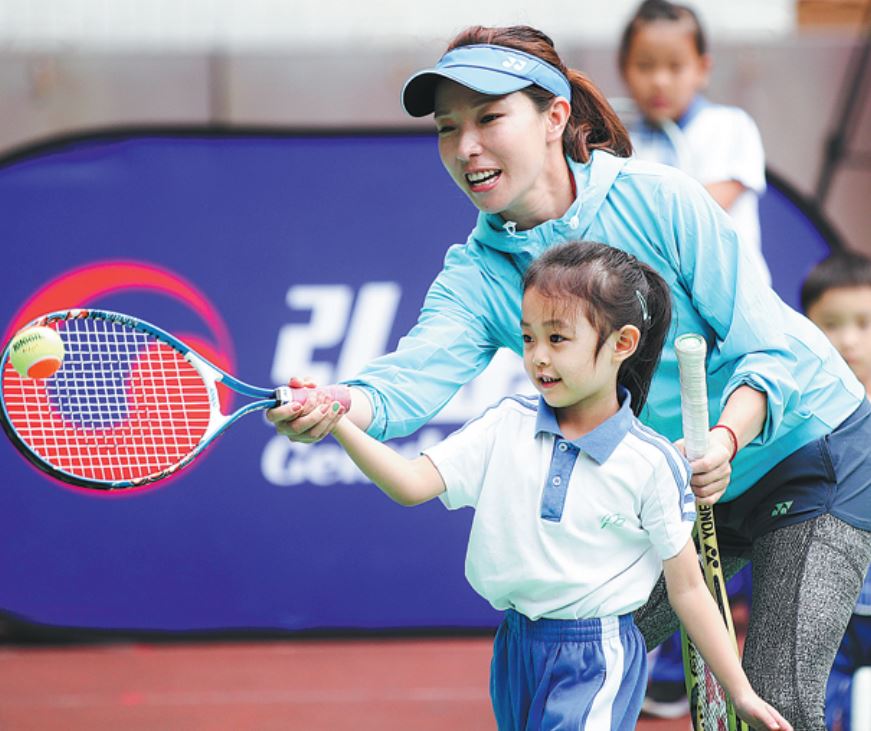Shenzhen serves up excellence with long-term growth plan
 0 Comment(s)
0 Comment(s) Print
Print E-mail China Daily, October 31, 2019
E-mail China Daily, October 31, 2019

Impressed by the strong debut of the WTA Finals in Shenzhen, tennis legends have high hopes the tournament will serve as an impetus for further growing the game in China over its 10-year run.
From having no events to play at home when she turned pro in 2003 to now watching the women's season finale draw huge crowds in her backyard, China's Zheng Jie marvels at the sport's rapid expansion in her home country - underlined by the increased number and caliber of tournaments over the past decade.
"It's no doubt that a ground-shaking change has hit the landscape of the game," Zheng, China's first Grand Slam semifinalist (2008 Wimbledon), said on the sidelines of the ongoing WTA Finals.
"When I finally made it to the pro circuit, I had to raise money by all means to travel abroad only four times a year because no events at home were offering ranking points.
"Nowadays girls can just stay home while all the big events are coming to their cities. I still can't believe how far tennis has gone, even as I am witnessing all the changes."
As a member of China's trailblazing "Golden Flowers", Zheng, alongside two-time major singles champion Li Na and doubles specialist Yan Zi, helped put China on the tennis map with their groundbreaking results a decade ago.
Zheng, a tough counterattacker, set the earliest examples of Grand Slam success for her compatriots by winning doubles titles at the Australian Open and Wimbledon with partner Yan in 2006, followed by her run to singles semifinals in London in 2008 and Melbourne in 2010.
Thanks to the impact of Zheng's generation, growing public interest and government support for tennis have made China a major host of high-profile tournaments, with nine WTA tour-level events, concluded by the Finals, held on the mainland this year - up from just two (Guangzhou and Beijing) in 2004.
The Finals feature the highest-ranked eight singles stars and doubles teams in a round-robin group stage, followed by semifinals and finals to compete for a share of the sport's biggest prize pool of $14 million.
Zheng figures the financial might of local government and organizers makes its easy to stage events on the scale of the Finals, but the real question is how to maximize their influence to enhance the culture and understanding of tennis in China.
"I hope it can bring more attention to tennis in the region and send a message to the world that Shenzhen is serious about developing the sport over the long term," said the 36-year-old, who now operates a junior tennis academy in the city.
"Ultimately, we need to bring up our own young players to make it to the Finals to maintain the sport's surging momentum."
Four years into her retirement, Zheng remains deeply involved in the sport, recently overseeing the tenth edition of the annual youth tournament that carries her name. The "Zheng Jie Cup", which concluded with a national final at her club in Shenzhen following an eight-city preliminary, involved 2,000 players aged 8-12.
Swiss legend Martina Hingis, the official ambassador of the Finals, visited the Cup's award ceremony on Sunday as Zheng's guest.
"I think she's doing a great job," said Hingis, who retired for a third time in October 2017 with five singles and 13 doubles titles at Grand Slam tournaments.
"It's been 10 years that she has this trophy, helping Chinese kids in different cities to play. I wish we had so many kids in Switzerland to play tournaments. Definitely we will keep in touch. Maybe someday we can do something together."
The 39-year-old Hingis was on the frontline of tennis' ascent in China after competing regularly in doubles in Beijing, partnering with India's Sania Mirza and Latisha Chan of Chinese Taipei to win in 2015 and 2017 respectively.
"I think it's always important to have role models. To have a women's tennis tournament here, it's great for us and for women's tennis," said Hingis.
"China already made big steps with Li Na and Zheng Jie, but I think you always need new role models to look up to. Hopefully a lot of young girls will pick up tennis rackets in the future after watching the tournament here."
Ahead of the Finals, Zheng and Hingis were invited as mentors to attend the WTA Future Stars junior program, which was established in 2014.
The Future Stars brought together 56 players, including eight Chinese, from across the Asia-Pacific region and North America to compete in under-14 and under-16 elimination events in Shenzhen.
"Through workshops, interactive activities and mentorship opportunities over the eight days of the event, we hope to inspire these young players to pursue their passion for the sport ... and hopefully create a legacy for the next generation in China," said Future Stars director Donna Kelso.






Go to Forum >>0 Comment(s)